Staging a theatre production was never for the faint-hearted. Staging three at the same time, during the restrictions of a global pandemic is a whole new level of bravery.
In his first term as Director of Drama Performance that’s what Jonathan Munby decided to do with College’s The Richard Burton Company.
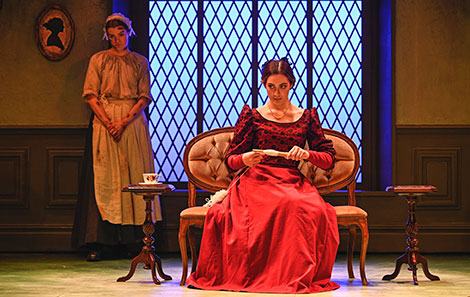
The Moors, photo: Kirsten McTernan
He explains how he and his team went about it:
Jonathan, you’ve spent 23 years in theatre working on hugely successful productions, so you’re no stranger to challenges. What were the biggest challenges of the In Camera season?
Well firstly we had to find a way of getting this work out to the public. Because of Covid restrictions, our doors are currently shut to the public and we can’t invite audiences into our theatres to see the work. One of the most important things for our productions is for them to be seen, so the question was ‘how do we achieve this?’ How do we find creative ways to make the work accessible.
An obstacle turned into a wonderful bonus in that, through filming the shows, we can actually reach a much wider audience digitally than we ever could have by just bringing audiences into a theatre.
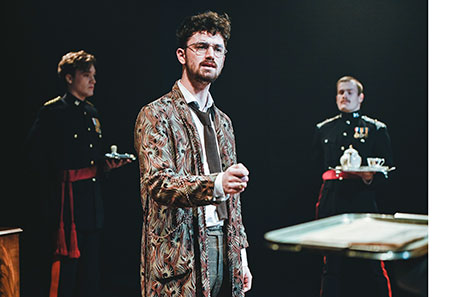
Twelfth Night Remembered. Photo Kirsten McTernan
How did you approach balancing creative ambition with the strict regulations?
Again, we found creative solutions through close collaboration between actors and the creative teams and by keeping close to current industry practice. We introduced moments of theatrical stylization and innovative, creative ways of storytelling.
Once we’d acknowledged the limits of the restrictions we allowed our imaginations to run wild within that framework and had fun making the most of the technology to push our boundaries. Often great creativity can come from tight restrictions. Once we’d made the choice to film the season, we embraced and celebrated the hybrid nature of bringing theatre and film together to create something new.
Talking to colleagues at the National Theatre, they’re currently trying something similar with Romeo and Juliet which will be really interesting.
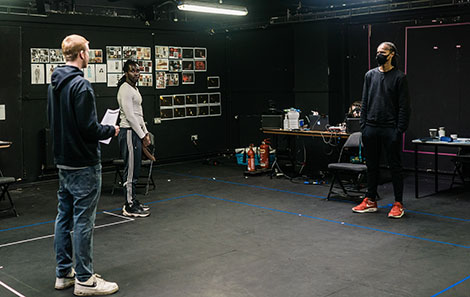
Statements After an Arrest rehearsal with director Nicholai La Barrie
How did you navigate social distancing with scenes of physical closeness?
There were key storytelling moments that we needed to find solutions for – those essential moments where actors need intimacy to make sense of the story, whether that’s a reunion or discovery of love. We used a system of fixed teams of actors which meant a small number of students who were already part of the same household.
The work we created became an extension of their domestic lives without introducing extra risk.
What happened when actors needed to touch things on set as part of the action?
We used theatrical smoke and mirrors to give the illusion that the worlds we were creating were not worlds in a pandemic. That was important, to have recognizable human behaviour. It meant we needed to take a number of extra measures to safeguard our actors. So objects were carefully cleaned and disinfected and only ever passed between two specific people, who each had sanitized hands. We also made sure items of costume were only handled by the cast, where they’d usually have a dresser helping them.
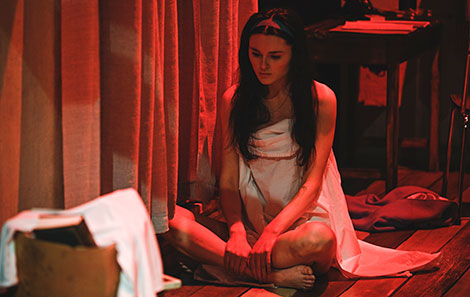
Statements After an Arrest. Photo Kirsten McTernan
Were the risks around airborne particles and vocal projection a factor?
With Twelfth Night Remembered I wanted to film in as few shots as possible to keep the integrity of live theatre. It may look like one long single shot but in fact it’s five, with the longest being 31 minutes.
There are important measures in place to keep everyone safe from aerosol and droplet dangers. After any singing, we observed a break, where everyone vacated the space to allow any droplets to settle, so those became the five shots.
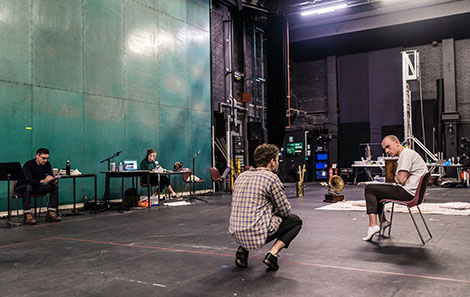
Twelfth Night Remembered, rehearsal with Jonathan Munby
It’s one reason we could never have delivered a production like Twelfth Night Remembered on stage at this time. The continuous shot idea is also an homage to the Lars von Trier film Dogville and the way a single shot camera captures the imagination of audiences in later films such as Sam Mendes’ 1917.
Read Jonathan’s article with RWCMD acting grad and actor Keiron Self in Buzz magazine.
View In Camera Online from Tues 19 – Sun 31 Jan 2021
Two other plays featuring the MA actors, (In the Blood, written by Suzan-Lori Parks, directed by Lekan Lawal and Yen by Anna Jordan, directed by Zoë Waterman), and the annual Musical Theatre Christmas Cabaret, will be shared with the industry.
Featured image from The Moors. Photo Kirsten McTernan
Related Stories
Croeso, RWCMD’s New Director of Performance (Drama), Jonathan Munby
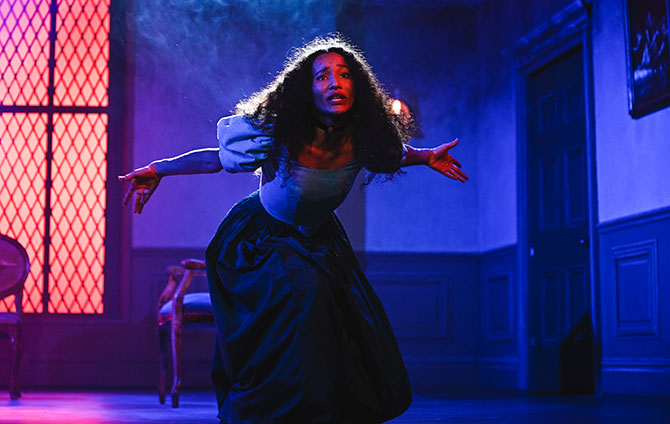
Share on Twitter
Share on Facebook